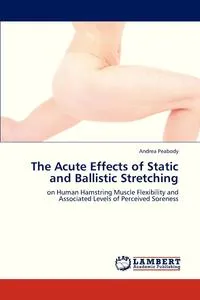The Acute Effects of Static and Ballistic Stretching
Автор: Peabody Andrea
Переплёт: Мягкая обложка
📓 Stretching routines are routinely integrated into the rehabilitation programs of injuries requiring immobilization. Static stretching has been promoted as the safest, most effective, and most comfortable method of stretching whereas the diametric opposite ballistic technique has been essentially shunned by the rehabilitation community due to its' correlated risk of injury and patient discomfort. The purpose of this investigation was to examine the kinematics and levels of perceived soreness associated with static and ballistic hamstring stretching to compare for any differences in benefits or drawbacks between the techniques. While both STA and BAL methods of stretching did create gains in forward movement similarly, STA stretching was found to cause significantly more discomfort than BAL stretching, and thus contraindications towards ballistic stretching may be unjustified. Future research should examine these variables controlling for additional and accessory motions as well as examining the kinematics of the actual BAL and STA stretching maneuvers.
Мнения
